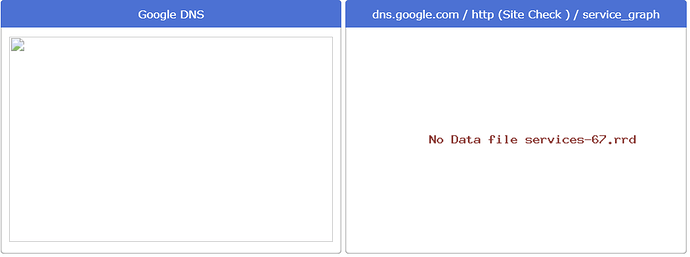Hi I really hope someone will help me.
I had an old Docker that tended to crash randomly .
So last week I downloaded the new docker from Dockerhub (link fromLibrenms.org)
Configured it as pr. old Docker configuration only change is the name (old: Librenms new: Librenms2021)
Ran the cleanup DB tasks and it seems to work. But there is no graphs showing:
In the RRD folder for DNS. Google:
/data/rrd/dns.google.com$ ls
availability-2592000.rrd availability-86400.rrd poller-perf.rrd
availability-31536000.rrd ping-perf.rrd
availability-604800.rrd poller-perf-availability.rrd
Validate.php:
Librenms2021:/opt/librenms$ ./validate.php
| Component | Version |
|---|---|
| LibreNMS | 21.6.0 |
| DB Schema | 2021_25_01_0127_create_isis_adjacencies_table (210) |
| PHP | 7.4.19 |
| Python | 3.8.10 |
| MySQL | 10.4.12-MariaDB-1:10.4.12+maria~bionic |
| RRDTool | 1.7.2 |
| SNMP | NET-SNMP 5.9 |
| ==================================== |
[OK] Installed from package; no Composer required
[OK] Database connection successful
[OK] Database schema correct
[WARN] IPv6 is disabled on your server, you will not be able to add IPv6 devices.
[FAIL] Cannot connect to rrdcached instance
[WARN] Non-git install, updates are manual or from package
Config.php:
Have a look in includes/defaults.inc.php for examples of settings you can set here. DO NOT EDIT defaults.inc.php!
Database config
$config[‘db_host’] = “192.168.1.11”;
$config[‘db_user’] = “root”;
$config[‘db_pass’] = “######”;
$config[‘db_name’] = “librenms”;
// This is the user LibreNMS will run as
//Please ensure this user is created and has the correct permissions to your install
$config[‘user’] = ‘librenms’;
This should only be set if you want to force a particular hostname/port
It will prevent the web interface being usable form any other hostname
$config[‘base_url’] = “/”;
Default community
$config[‘snmp’][‘community’] = array(‘public’);
$config[‘snmp’][‘community’] = array(‘Location1’);
$config[‘snmp’][‘community’] = array(‘Location2’);
Authentication Model
$config[‘auth_mechanism’] = “mysql”; # default, other options: ldap, http-auth
#$config[‘http_auth_guest’] = “guest”; # remember to configure this user if you use http-auth
List of RFC1918 networks to allow scanning-based discovery
#$config[‘nets’][] = “10.0.0.0/8”;
$config[‘nets’][] = “192.168.88.0/24”;
$config[‘nets’][] = “192.168.1.0/24”;
$config[‘nets’][] = ‘172.17.2.0/24’;
Uncomment the next line to disable daily updates
#$config[‘update’] = 0;
Number in days of how long to keep old rrd files. 0 disables this feature
$config[‘rrd_purge’] = 0;
Uncomment to submit callback stats via proxy
#$config[‘callback_proxy’] = “hostname:port”;
Set default port association mode for new devices (default: ifIndex)
#$config[‘default_port_association_mode’] = ‘ifIndex’;
Enable the in-built billing extension
#$config[‘enable_billing’] = 1;
Enable the in-built services support (Nagios plugins)
$config[‘show_services’] = 1;
$config[‘nagios_plugins’] = ‘/usr/lib/nagios/plugins’;
$config[‘debug’][‘run_trace’] = true;
Traceroute
#$config[‘traceroute’] = ‘/usr/bin/traceroute’;
#$config[‘traceroute6’] = ‘/usr/bin/traceroute6’;
Show names on dashboard
$config[‘force_ip_to_sysname’] = true;
$config[‘force_hostname_to_sysname’] = true;
$config[‘rrd_dir’] = “/data/rrd”;
$config[‘distributed_poller_memcached_host’] = “librenms”;
$config[‘distributed_poller_memcached_port’] = 11211;
$config[‘rrdcached’] = “Librenms2021:42217”;
$config[‘rrdcached_local’] = “unix:/var/run/rrdcached.sock”;
$config[‘rrdtool_version’] = “1.5.5”;
$config[‘log_file’] = “/data/logs/librenms.log”;
$config[‘log_dir’] = “/data/logs”;
$config[‘update_channel’] = “master”;
I cannot find the “rrdcached.sock” file.
Rrdtool version is 1.7.2.
I hope to get this resovled.
